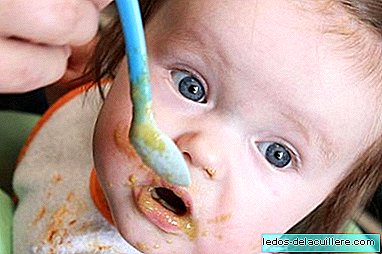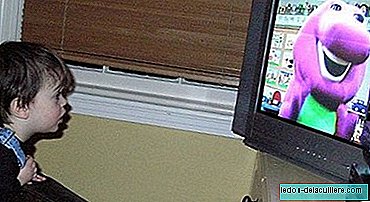
When we offered you the complete complementary feeding guide a few months ago, we explained that the recommendations when it comes to starting to feed the babies say that the best moment is from 6 months.
Some guides speak of the four months as the age from which babies can already start eating, but since that recommendation clashes frontally with that of breastfeeding until six months exclusively, what they are trying to impose is the six months as an ideal time to start giving them food other than milk.
Despite this, despite the fact that complementary feeding should begin at 6 months (or 4 months if we allow what some guides say) There are many babies who start eating early. And I don't talk about before 6 months, that too, but that many do it even before 4 months, although it is completely discouraged.
Why from 6 months
We say that the ideal is to start feeding them at 6 months because it is the moment in which they are able to stay more or less sitting, the moment in which they are able to take things by hand (food) and take it to the mouth and the moment in which surely they do not have the extrusion reflex, responsible for making them spit everything that enters the mouth and is not milk.
In addition, as breast milk is the most nutritionally complete food that exists, and how it also contributes defenses For babies, there is no reason to give less milk and more food before six months. In fact, it is better not to.
After 6 months, taking advantage of their curiosity, they start giving them food to try new flavors, know the textures and gradually become accustomed to what will be their food for the rest of their lives (so there is no hurry , because they will have a lifetime to eat everything).
There are babies who are eating before 4 months

Even if we talk about artificial milk, it has been recommended for years that the main feeding during the first 6 months be milk, and from then on, start to supplement the milk with other foods.
However, there are many babies that start before 6 months, and the reality is that they are not precisely few. As they tell us in Consumer, a study published in Pediatrics showed that of 1,500 women surveyed, 40.4% had given food to their children before 4 months. When breaking down the figures, they saw that when women were breastfeeding, 24.3% did so, and that when they gave artificial milk, 52.7% did. The ones that gave mixed 50.2%.
When valuing the figures, limiting the six months, they saw that 92.9% of babies had already eaten something before they were delivered. Given that 6 months is considered the ideal time to start, the researchers concluded that most families were "early incorporator" of complementary feeding.
But why do they do it?
Well, largely because decades ago it was normal. I recommended 15 years ago, when I worked in pediatrics for a few months, to give orange juice at 3 months of age. At that time it was what was recommended in the center where I worked and it was what we all said.
The grandmothers of today's babies remember him: "I gave them this or that at 3 months" and they feel that when at 4 months they are drinking only milk they are being malnourished: "Baby, I would give you something, because what I see that he is hungry, "" At that age I already gave you fruit and cereals, even meat, "" Look how he looks at us eating, and you come to give him only milk. "
And as babies cry because they have no other way of communicating their needs, that is the most plausible explanation they find. If they are smaller, they are colic, if they are older, the teeth, but if they are in the range of 4 to 7 months, then must be hungry, need to eat other things, that they are bored of milk or that they feel like giving them something else, even if pediatricians insist that they only drink milk.
According to the study, mothers who gave food to babies before 4 months did so because:
- My baby was old enough (88.9%): In fact, it is the opposite. They are still small.
- My son seemed hungry (71.4%): but this is the same as when they are smaller, right? They are given their milk and go.
- My child wanted to try my food (66.8%): With three months is unlikely. It can be understood that a 5-month-old baby makes the gesture of taking the food, trying to get up, but with 3 months many have not yet begun to direct their hand towards what interests them.
- I wanted to feed my child with something other than breast milk or formula (64.8%): nothing to add.
- A doctor or other healthcare professional advised me (55.5%): that is, that more than half of the mothers were given a wrong advice by a doctor or healthcare professional.
- I thought I would sleep more during the night (46.4%): If so, there would not be hundreds of books, pages and forums talking about the children's dream. They would be fed and arranged.
So what was said, do not hurry to feed them and, when you do, take advantage of his innate curiosity. That they taste, that they catch, that they put in the mouth, that they touch, that they knead, that they stir in the mouth, that they spit, that they swallow and that, little by little, eat more and more. Do not force them to eat, because the grace is that they like to eat and that it does not become a moment of pressure, coercion and discomfort.
Photos | Thinkstock
In Babies and more | Supplementary feeding: How much does my child have to eat? (I), Complementary feeding: "Baby-led Weaning", Complementary feeding: how to feed a baby through "Baby-led Weaning"












